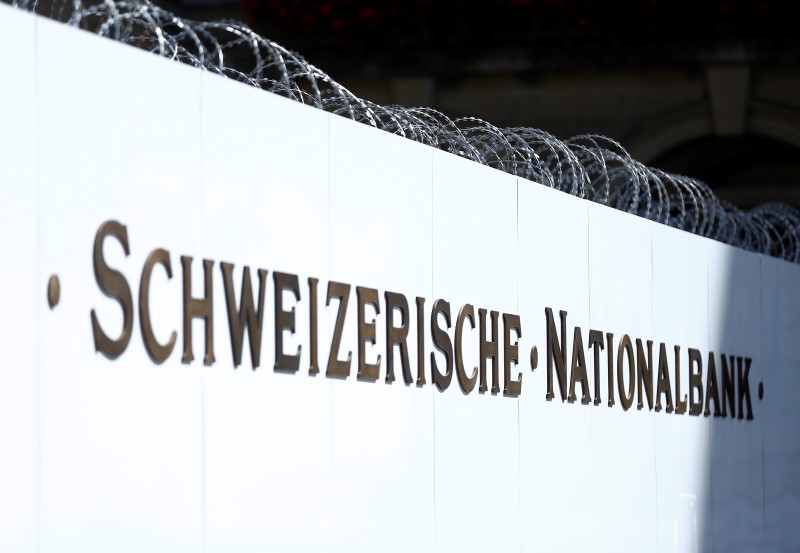By Joshua Franklin
ZURICH (Reuters) - Switzerland's central bank left interest rates unchanged at record lows, cut its economic outlook and forecast a deeper bout of deflation as cheaper oil and slowing global growth weigh on the economy.
The Swiss National Bank now expects consumer prices to rise 0.1 percent in 2017, just within its target of above zero but less than 2 percent a year.
"The global economic outlook has deteriorated slightly in recent months and the situation on international financial markets remains volatile," the SNB said in a statement.
"Around the world, manufacturing and trade remained sluggish, contributing to a further sharp fall in oil prices."
In Thursday's quarterly policy assessment, the SNB kept its target range for three-month Libor in negative territory, between -1.25 and -0.25 percent, as economists polled by Reuters unanimously predicted.
It also maintained a charge on cash deposits of 0.75 percent and repeated its pledge to intervene in the currency market if necessary to weaken the "significantly over-valued" Swiss franc.
A muted response from the franc to the European Central Bank's decision to cut rates and expand asset purchases last week had lessened the SNB's need to act on rates.
"As long as the ECB doesn't cut interest rates further, I don't think the SNB will cut rates," said Credit Suisse (SIX:CSGN) economist Maxime Botteron.
Currency markets shrugged off the rate decision.
FURTHER MEASURES
A rate cut further into negative territory would have drawn more criticism from banks, insurers and pension funds, which have had to pay the deposit charge on some of their cash holdings.
The SNB is using negative rates, coupled with an unspecified amount of foreign currency purchases, to weaken the franc and protect exports to the euro zone, Switzerland's biggest trading partner.
The two-pillar approach has helped to weaken the franc against the euro (EURCHF=EBS) in recent months and take some of the shine off its safe-haven status. The franc trades at around 1.09 per euro just over a year after the SNB abruptly abandoned a floor of 1.20.
Speaking to Swiss television, SNB Chairman Thomas Jordan left the door open for further policy action if needed.
"We do not rule out further measures," Jordan told SRF. "But for the moment, after a comprehensive analysis, we concluded that the current monetary policy is the right one and we want to keep to this monetary policy for the moment."
The SNB trimmed its outlook for Swiss gross domestic product (GDP) growth this year to between 1 percent and 1.5 percent from around 1.5 percent in its December forecast. Its outlook for inflation this year is now -0.8 percent, down from -0.5 percent previously.
The SNB had previously forecast 2017 inflation of 0.3 percent. For 2018, it expects inflation of 0.9 percent.

"The SNB was a bit too optimistic in December regarding inflation and GDP," said Botteron. "But I don't think it's a signal for future monetary policy. The (growth revisions) will not have any impact on monetary policy."